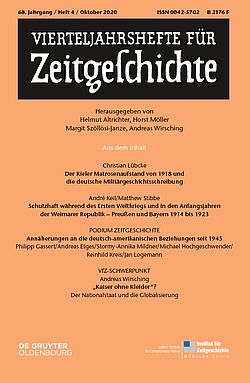- The Institute
- Research
- Dictatorships in the 20th Century
- Democracies and their Historical Self-Perceptions
- Transformations in Most Recent History
- International and Transnational Relations
- Edited Source Collections
- Dissertation Projects
- Completed Projects
- Dokumentation Obersalzberg
- Center for Holocaust Studies
- Berlin Center for Cold War Studies
- Publications
- Vierteljahrshefte
- The Archives
- Library
- Center for Holocaust Studies
- News
- Dates
- Press
- Recent Publications
- News from the Institute
- Topics
- Munich 1972
- Confronting Decline
- Feminist, Pacifist, Provocateur
- Der Mauerbau als Audiowalk
- Digital Contemporary History
- Transportation in Germany
- Envisaged Futures at the End of the Cold War
- From the Reichsbank to the Bundesbank
- German Federal Chancellery
- History of Sustainabilities: Discourses and Practices since the 1970s
- Changing Work
- Democratic Culture and the Nazi Past
- The History of the Treuhandanstalt
- Foreign Policy Documentation (AAPD)
- Dokumentation Obersalzberg
- Hitler, Mein Kampf. A Critical Edition
- "Man hört, man spricht"
- IfZ
- Vierteljahrshefte
- VfZ Archive
- Issue Index
- Issue October 2020
Issue 4/2020
Content Overview: English Titles and Abstracts:
- Christian Lübcke: “It Has Nothing to Do with Establishing the Truth”. The 1918 Kiel Mutiny and German Military Historiography.
- André Keil/Matthew Stibbe: A Laboratory for the State of Exception. Protective Custody during the First World War and the Early Weimar Republic – Prussia and Bavaria, 1914 to 1923.
- Contemporary History Podium: Beyond Donald Trump. Contemporary Historical Approaches to the German-American Relations since 1945: Philipp Gassert, Andreas Etges, Stormy-Annika Mildner, Michael Hochgeschwender, Reinhild Kreis und Jan Logemann.
- Andreas Wirsching: “An Emperor Without Clothes”? The Nation State and Globalisation.
Abstracts
Christian Lübcke, “It Has Nothing to Do with Establishing the Truth”. The 1918 Kiel Mutiny and German Military Historiography
To date, the 1918 Kiel Mutiny is the largest mutiny in German history. Within the space of a few days, individual uprisings by sailors developed into a countrywide revolt in the navy and army, which culminated in the November Revolution. For decades, German military historiography had great difficulties with this nexus of events, strongly influenced by the fact that official war historiography, which was dominated by actors in uniform, enjoyed a monopoly on sources and interpretation. On the basis of hitherto disregarded documents, Christian Lübcke can show that during the Weimar Republic, the Third Reich and the young Federal Republic views predominated, which had little to do with scholarship and much more with self-justification, revisionism and apologia.
André Keil/Matthew Stibbe, A Laboratory for the State of Exception. Protective Custody during the First World War and the Early Weimar Republic – Prussia and Bavaria, 1914 to 1923
This article examines continuities in the use of protective custody as an instrument of the state of exception between 1914 and 1923, focusing on the two largest German states, Prussia and Bavaria. It treats protective custody not only as a judicial construct, but as a new, experimental space for executive action against a range of imagined “internal enemies”, some social, some political. The article argues that differences between the formal legal frameworks surrounding protective custody in Prussia and Bavaria had little impact on its practical use or political intent. Furthermore, in both states protective custody produced a set of mentalities that extended well beyond the war itself, helping to underpin the violent foundations of Weimar’s early years. Nonetheless, a variety of checks and balances – including in the legal and political realms – ensured that there were as yet no direct portents of the Nazi terror of 1933/34.
Contemporary History Podium: Beyond Donald Trump. Contemporary Historical Approaches to German-American Relations since 1945
The “Contemporary History Podium” takes a critical look at German-American relations since the end of the Second World War. In this process, it identifies factors of stability and change, investigates continuities and caesuras, measures the specific weight of organisational structures in international politics, critically examines the influence of the compatibility of personalities and fathoms the limits of transatlantic understanding. The “Contemporary History Podium” thus presents five sectoral analyses of fields with special importance: One, the bilateral political relations in the context of international politics (Philipp Gassert); two, partnership and controversies with special emphasis on security and alliance policy (Andreas Etges); three, economy, trade and finance as both stabilising and conflict-laden pillars of transatlantic exchange (Stormy-Annika Mildner); four, boom and bust of conservatism as a measure for communication channels and blockages between Germany and the USA (Michael Hochgeschwender); five, mutual perceptions, images and stereotypes, whose deconstruction allows for a better understanding of the degree of proximity or unfamiliarity (Reinhild Kreis and Jan Logemann).
Andreas Wirsching, “An Emperor Withour Clothes”? The Nation State and Globalisationan Eckel, Politics of Globalisation. Clinton, Blair, Schröder and the Reinvention of the World during the 1990s and 2000s
Globalisation is one of the most important concepts of our time and requires systematic analysis in order to become accessible for research. The relationship between the nation state and globalisation is particularly laden with tensions and thus poses a methodological challenge for contemporary historiography. Contemporary history should accept this challenge and enter into a dialogue with the social sciences about this important topic. The article pleads for a narrow concept of globalisation starting around 1970, which helps distinguish recent developments from those of earlier centuries. During this time, globalisation began as a political project of the Western industrialised countries, headed by the USA. Since the 1990s, it fundamentally changed the concepts of space of the nation states. The increasing fluidity of national borders was declared to be part of long-term national traditions, which led to considerable differences in the respective national attitudes to globalisation.
04/09/2024
„Die Lebensbeichte des Bandera-Mörders“
Der "Münchner Merkur" zu Grzegorz Rossoliński-Liebes Dokumentation im Aprilheft der VfZ
mehr
04/04/2024
„Die Beichte des Mörders von Stepan Bandera“
Die „Süddeutsche Zeitung“ zu Grzegorz Rossoliński-Liebes Dokumentation im Aprilheft der VfZ
mehr
04/02/2024
Druckfrisch: VfZ 2/2024
Das Aprilheft der Vierteljahrshefte für Zeitgeschichte ist erschienen
mehr








